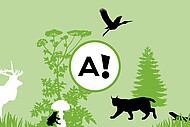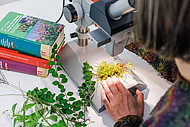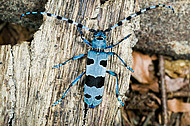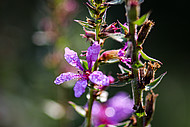Species knowledge for everyone. The Karlsruhe Taxonomy Initiative

Ein Projekt für mehr Artenkenntnis

Bestimmung von Pflanzen mit Literatur und Stereomikroskop

Alpenbock (Rosalia alpina). Ähnlich gefärdet wie Artenkenner

Gewöhnlicher Blutweiderich (Lythrum salicaria). Für jede*n leicht zu erkennen.

Das Projekt wird gefördert von der Stiftung Naturschutzfonds aus zweckgebundenen Erträgen der Glücksspirale
A new project started in autumn 2022: the "Karlsruher Taxonomy Initiative". The aim of the project is to strengthen education in the area of species knowledge and taxonomy of plants, fungi and animals in the region. It is anchored at the Natural History Museum in Karlsruhe at the interface between science, public relations and education and is financed for three years by the Baden-Württemberg Nature Conservation Fund. The biologist Dr. Judith Bieberich is responsible for setting up and establishing this new project.
Taxonomy is the systematic classification of all living things into groups according to their relationships. Today she works with a variety of classic and modern methods, such as morphological investigations and genetic analyses.Taxonomyis the basis for getting an overview of the fascinating variety of living beings and for being able to identify species.
However, knowledge of species has declined sharply in recent decades. Many people have little or no knowledge of plants, animals and fungi, and even specialists with scientific expertise have become rare. One of the reasons for this development is that species knowledge and taxonomy are only rarely taught in schools and universities because they have been superseded by molecular biology disciplines.
Currently, the importance of species knowledge is increasingly being rediscovered. The decline in biodiversity is one of the most pressing problems of global change and requires nature conservation strategies. However, in order to be able to assess the endangerment of species and the success of protective measures, one must be able to identify the species. Therefore, professional experts with species knowledge are desperately needed. But even among the general public, knowledge of nature promotes its protection: what one knows, one respects and protects. Of course, knowledge of species becomes essential when species are used. Plants and mushrooms should only be collected and eaten if they can be recognized and identified with certainty. Last but not least, it is simply a pleasure to take a walk in everyday life to recognize species and learn about how they live, what they can do and what significance they have for us. And identifying species can be a real exciting puzzle!
As part of the Karlsruhe Taxonomy Initiative, a wide range of educational offers on the subject of species knowledge and taxonomy are to be developed and implemented. Specialists and institutions in this area in the North Baden area are to be better networked with one another. The Karlsruhe Taxonomy Initiative is already networked with the Integrative Taxonomy Initiative of the State of Baden-Württemberg. Of course there will also be a cooperation with the very active Natural Science Association Karlsruhe e.V., which is closely connected to the Natural History Museum.
As a public biodiversity research institution, the tasks of the Karlsruhe Natural History Museum also include acting as a contact for authorities and the population to offer support in nature and environmental protection issues. This is how identification inquiries have been answered for a long time. This function as a contact point to which interested parties can turn with questions about species and their determination is to be strengthened and improved within the framework of the Karlsruhe Taxonomy Initiative.
The Natural History Museum in Karlsruhe offers the best conditions for such a project: Its scientific staff in the departments of biosciences and geosciences have rare knowledge of species. Furthermore, the museum provides a wide range of nature and environmental education, including the basics of species knowledge. As one of the largest research museums in Germany, the Natural History Museum in Karlsruhe already maintains intensive contacts with other experts and institutions in the field of environmental education. Ideal conditions for the start of the Karlsruhe Taxonomy Initiative!
Dr. Judith Bieberich, M.Sc.
Phone: +49 721 175 2863
E-Mail: judith.bieberich[at]smnk.de

Dr. rer. nat. Rainer W. Bussmann, Dipl. Biol.
Phone: +49(0)721 175 2848
E-Mail: rainer.bussmann[at]smnk.de

Dr. Hubert Höfer, Dipl.-Biol.
Phone: +49 721 175 2826
E-Mail: hubert.hoefer[at]smnk.de





